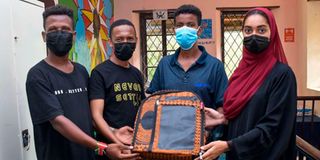Swahili Pot: Giving budding entrepreneurs chance to pitch ideas

Founder of roka bag with other swahili pot members during a presentation.
What you need to know:
- Hub is an open centre where mentoring and conceptualisation of potential products for the market is done.
- The main challenge they currently face is sufficient space to accommodate all participants.
Every Thursday, groups of young and budding entrepreneurs with a nose for business meet at the Swahili Pot, a hub that incorporates art and technology, to pitch their business ideas.
Here at the facility, which looks like a classroom, start-up groups of two or three huddle together, either discussing or working on a project.
When we visited the hub, located in Old Town, Mombasa, a young man passionately explains what an app he is building is all about. Technology has always greatly interested Ken Gitonga.
“Using this app, a business can manage its basic activities from a mobile smartphone,” begins Gitonga.
The app, StockApp, has been in use since July 2019. It tracks sales, stocks, profits and expenses, data that packs a wealth of information for any business. The app is on Playstore, and has users in over 52 countries, according to Gitonga.
But there is more that goes on at the Swahili hub besides pitching. Once the business completes pitching an idea, the audience, which consists of investors and judges, is given an opportunity to ask questions.
This pitching, which used to take place every Thursday, helped Gitonga and his team scale up their app and learn how to price their services, as well as how to capture different markets in Kenya and beyond.
After he completes his pitch, a young woman comes up on stage to talk about her five-year cake business.
“My name is Amina Ahmed Khalid, and my business is called Minat Bakery, it has been in operation since 2016,” she begins, and explains that besides baking cakes for sale, the company also trains youth, and later on employs some of them.

Amina Ahmed is the founder of Minat Bakery, a six-year-old business.
‘Pitching Thursday’, explains the Founder of Swahili Pot Hub, Mahmoud Noor, came about when they realised that there are many people who have business ideas but lack the platform to express them, or a market for them.
Noor explains that the hub is an open centre where mentoring is done, including conceptualisation of potential products for the market.
He likes to call it a brainstorming centre that plays host to numerous people from different backgrounds but with brilliant business ideas.
The hub has a network of start-up founders, investors, corporate partners and local business professionals.
“We started out with members of the Mombasa community, who would visit the hub to pitch their business. After pitching, they would get feedback on aspects that needed improving, how to market the business, while others would volunteer as communication, tech or marketing personnel for the business,” says Noor.

Mohammed Noor the Director of Swahili Pot.
With time, they introduced judges and investors who give their input too. The best business idea qualifies to showcase at the Pwani Innovation week.
Like all businesses, this one faced setbacks during the Covid-19 pandemic.
“The pitching would take place every Thursday, but due to the pandemic, we moved it to every last Thursday of the month. At times, we would conduct it virtually to comply with social distancing restrictions.”
Though the restrictions have since eased, they still hold virtual pitching since it has enabled other counties to participate.
The main challenge they have currently is sufficient space to accommodate all participants as the initiative grows. Employment opportunities for those who undergo mentorship at the centre are also not fast coming, while they are also at pains to identify genuine entrepreneurs driven by passion, not just the money.
John Kamau, 31, is another beneficiary of this platform. He makes bags from recycled material used to make billboards. He lauds the benefits of the Pitching Thursday space.
“I managed to sell eight bags on the day I pitched my business, the networking really opened up the market for us,” says Kamau.
Another beneficiary is Jack Hartpence whose business, ‘PowWater’ has now expanded to the US.
“The business started in August 2017, with an aim to supply safe drinking water in areas where people are unable to access clean water. We have managed to impact over 80,000 people around the world through our business,” says Hartpence, adding that the company is now working on an app inspired by judges and networking with other entrepreneurs.





